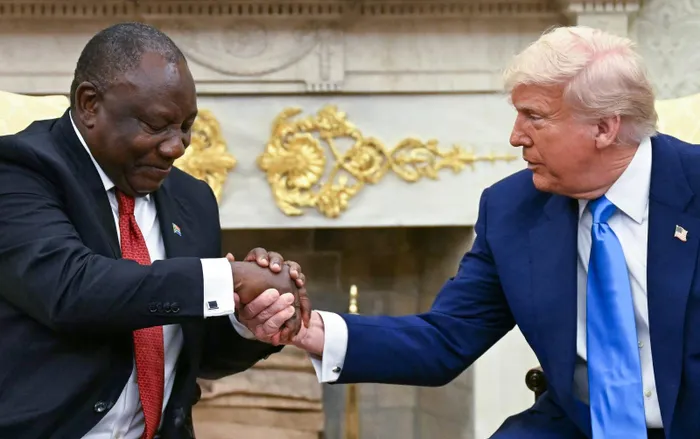
President Cyril Ramaphosa shakes hands with his US counterpart Donald Trump during a visit to the White House in Washington DC earlier this year. Trump has announced a 30% tariff on South African goods and produce exported into the US from August.
Image: AFP
RESETING strained relations with the Donald Trump administration topped the priority list of the South African delegation led by President Cyril Ramaphosa to the White House in Washington DC earlier this year.
The visit was necessitated by the hostilities Trump had unleashed on South Africa, including cutting aid funding for key HIV and TB programmes and his officials not attending G20 meetings in this country on false claims of white genocide.
The less said about what unfolded in that much publicised meeting, the better. However behind closed doors, the South African delegation had hoped to dispel the false claims.
It was always going to be a challenge convincing Trump and his MAGA buddies that there were no attacks targeted at white South Africans when they knew very well that they were playing politics in the first place.
Nonetheless, the local delegation reported ‘success’ in its mission to reset the relations with the US under Trump. The Americans were not bothered communicating the outcome of that meeting.
What has now become apparent is that the South Africans failed in that mission, judging by Trump’s announcement of a 30% tariff on goods and produce exported into the US from August. This indeed is devastating for a country that has had its economic growth stagnate over a marked period.
No matter how much we try to downplay this announcement, its impact will be felt on the farms and the automotive industry- sectors that have become the lifeblood of our economy. Just like some healthcare facilities have reported the severe impact the cutting of aid funding has on their operations, let alone on patients’ medication.
The situation will be made worse when the US government discontinues South African’s participation in the African Growth and Opportunity Act (AGOA) later this year.
What this moment calls for is bold leadership, something that has become foreign in our government. It means the era of relying on ‘hand outs’ is over.
It’s a rude awakening no country would want to be confronted with. Rich with key minerals the US also needs, South Africa must now move away from the ‘begging’ mentality just like China and other fellow BRICS countries have demonstrated. The question is whether there is political will to do so.